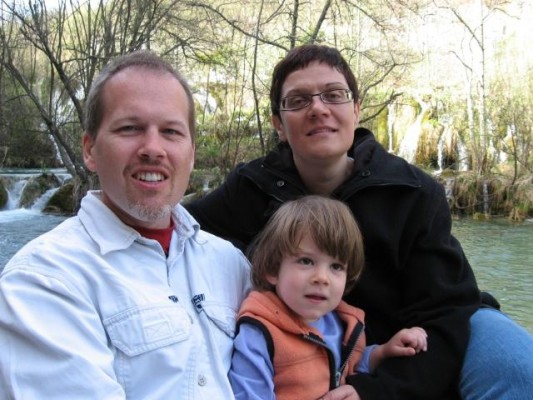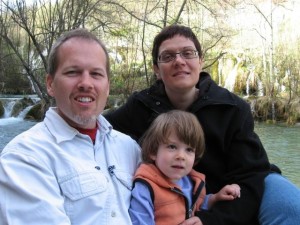I was born in Jajce, which is in Bosnia and Herzegovina. I lived there until the city went under siege in 1992 when I fled as a refugee and lived in another region until the end of the war in 1996.
A year later, I came to study at Eastern Mennonite University’s Center for Justice and Peacebuilding (CJP) where I graduated in 2002 with a degree in conflict transformation. My husband, Randy Puljek-Shank, is also a CJP graduate. We now serve as representatives for East Europe for Mennonite Central Committee (MCC), the relief and development organization of North American Mennonites. In our role with MCC, we work almost exclusively through local partners doing peacebuilding and community development.
Post-conflict life and trauma
I think attention to trauma healing and resilience is a necessary aspect of life here in the Balkans. Trauma has become a household word. There are many different forms of trauma that I observe within the individuals, community and society in which I live and work. There are no wars at present. But we experienced four wars[i] in the former Yugoslavia, between 1991 and 2000, each with different traumatic events. There were concentration camps and massacres. Many people were refugees. Some lived under siege for years, including the four-year siege of Sarajevo. People risked being shot by snipers every time they went out to shop or to go to work. Now there are civilians in our society with post-traumatic stress and reactions, including veterans.
There were other conditions that created continuous, ongoing high stress and trauma. For example, during the war nearly everyone was equal. Everyone was affected by the war and everyone qualified to get aid. When the war ended, “normal” life returned and people no longer had equal opportunities. The country’s infrastructure was in shambles. There were not enough jobs so the unemployment levels were high.
So a different kind of fight for survival started. The trauma of survival shifted from running away from guns during the war to the present situation of not having enough money to feed the family and send children to school.
Some people left the country, some people were lucky enough to get jobs, some people received financial help from the state to rebuild their houses or apartments, and some people did not get any kind of support at all.
Another part of the ongoing, complex trauma is what I call the political rape in our society. In the former Yugoslavia, with the exception of Slovenia, we live under the constant threat of potential armed conflict. This or that group wants to separate from this or that country. We justify the crimes committed in the region in the name of defense and out of fear. The politicians use this reality to get elected, stay in power and keep fear present, which increases mistrust and the inability to live together.
Through it all, I see the trans-generational transfer of trauma. My generation grew up hearing the stories of the horror World War II and elements of these stories have been played in front of our eyes in these last wars in former Yugoslavia. As a society we have successfully given a new generation our reservoirs of trauma and told them to carry it.
Healing and resilience
Following the war, the Balkans was in the midst of a humanitarian crisis. Immediate needs had to be met first through relief and rebuilding, then by a focus on development. In 2002 when Randy and I arrived back in the region, we tried introducing our partner organizations to trauma work. We translated parts of the STAR manual and adapted it to the local context. We did some basic trauma education, explaining what trauma is and exploring together how it impacts individuals and communities. We offered tools for individuals to develop their inner strength and resilience. There wasn’t a lot of interest.
It took five years until we began seeing more openness to trauma healing processes. We found relationship building as a way to open the door and develop trust, safety, and security to those we work with.
Currently, one of our partner organizations works with veterans from Bosnia, Serbia and Croatia. They offer a basic training where the veterans come from different sides of the conflict. During these week-long trainings they share about their experiences with war. It is very intense but it offers a space to listen, empathize and break down prejudices. The organization stays in touch with these veterans and gives them the opportunity to be involved in peacebuilding activities such as developing videos about the consequences of war, visiting each other’s front lines, and seeing each other’s memorials. A small number of veterans have become interested in being involved in the peacebuilding work. This might seem like a very small achievement but it is an important step in the trauma healing process for individuals and the community.
Moving forward
I believe we need to continue to find ways to allow ourselves to feel pain and grief. We can’t allow the constant fighting or post-traumatic stress to take our humanity away from us. Trauma healing can provide a safe place for crying, feeling the pain and reflecting on what happened as we learn to regain our humanity. Building positive social networks helps develop our communal resilience, to work together to overcome the obstacles that are present in daily life.
The longer we are here, the more we understand the significance of trauma education in the Balkans. We continue to take parts of STAR and adjust and adapt it for different aspects of our work. STAR is a cutting-edge approach to trauma across the world. It covers not only how you deal with on a psychological level but how it affects your entire being including physical, mental, emotional and spiritual.
Trauma healing gives hope as we change our focus to developing resilience in our society. This is why trauma is not only a curse, but a gift.
Amela Puljek-Shank lives in Sarajevo with her husband and son. She has worked as a facilitator and trainer with Seeds of Peace and with the STAR Project (Seminar on Trauma and Awareness and Recovery) for religious leaders at EMU.
[i] War in Slovenia 1991, in Croatia 1991-1995,in Bosnia and Herzegovina 1992-1995; and in Kosova 1999-2000).


this is really an inspirational story. I believe too that every soldiers need to continue to find ways to allow themselves to feel pain and grief. I also have a brother who is a soldier and he is suffering from anxiety disorder, i hope this website can help out. ~ Dealing with stress and anxiety